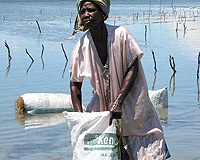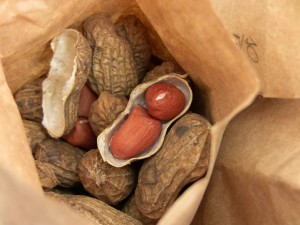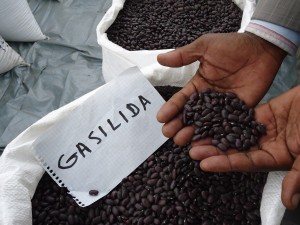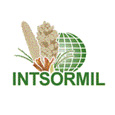2013: A busy six months for the Innovation Labs for Collaborative Research
Rebranding process initiated:
As part of a larger strategy designed to integrate the many diverse aspects of its Feed the Future initiative, USAID’s agricultural research programs that were collectively known as the Collaborative Research Support Programs (CRSPs) are being rebranded. Each CRSP will henceforth be known as the “Feed the Future Innovation Lab for Collaborative Research on [a subject area].” The changes will be formalized as new grant agreements are signed, but informally all of the programs are being encouraged to use the Feed the Future Innovation Lab language.
New grant agreements signed:
 On April 1, 2013, the Feed the Future Innovation Lab for Collaborative Research on Aquaculture & Fisheries (AquaFish Innovation Lab) got underway, following on from the work of the former Aquaculture & Fisheries CRSP. The mission of the AquaFish Innovation Lab is to enrich livelihoods and promote health by cultivating international multidisciplinary partnerships that advance science, research, education, and outreach in aquaculture and fisheries. Hillary Egna at Oregon State University continues to lead this innovative program designed to reduce poverty in developing countries by improving access by the poor to fish and water resources. AquaFish research and outreach work focuses on developing comprehensive, sustainable, and economically viable aquaculture and fisheries management systems in developing countries that contribute to food safety and food security.
On April 1, 2013, the Feed the Future Innovation Lab for Collaborative Research on Aquaculture & Fisheries (AquaFish Innovation Lab) got underway, following on from the work of the former Aquaculture & Fisheries CRSP. The mission of the AquaFish Innovation Lab is to enrich livelihoods and promote health by cultivating international multidisciplinary partnerships that advance science, research, education, and outreach in aquaculture and fisheries. Hillary Egna at Oregon State University continues to lead this innovative program designed to reduce poverty in developing countries by improving access by the poor to fish and water resources. AquaFish research and outreach work focuses on developing comprehensive, sustainable, and economically viable aquaculture and fisheries management systems in developing countries that contribute to food safety and food security.
 The former Peanut CRSP, now known as the Feed the Future Innovation Lab for Collaborative Research on Peanut and Mycotoxin (Peanut and Mycotoxin Innovation Lab), has also received an award to extend its work and will continue managing the program at the University of Georgia. In its new phase, the Peanut and Mycotoxin Innovation Lab will have projects in Ghana, Mozambique, Malawi, Zambia, and Haiti, and will increase its focus on the management of aflatoxin on peanuts and mycotoxins on other crops. It is anticipated that eight to twelve projects will be funded under its newly released RFP, including projects focused on genomics and breeding, mycotoxin mitigation and monitoring in developing countries, and enhancing peanut value chains in developing countries. Steven L. Brown is the Interim Program Director. A new Director, David Hoisington, will be taking over on September 1, 2013.
The former Peanut CRSP, now known as the Feed the Future Innovation Lab for Collaborative Research on Peanut and Mycotoxin (Peanut and Mycotoxin Innovation Lab), has also received an award to extend its work and will continue managing the program at the University of Georgia. In its new phase, the Peanut and Mycotoxin Innovation Lab will have projects in Ghana, Mozambique, Malawi, Zambia, and Haiti, and will increase its focus on the management of aflatoxin on peanuts and mycotoxins on other crops. It is anticipated that eight to twelve projects will be funded under its newly released RFP, including projects focused on genomics and breeding, mycotoxin mitigation and monitoring in developing countries, and enhancing peanut value chains in developing countries. Steven L. Brown is the Interim Program Director. A new Director, David Hoisington, will be taking over on September 1, 2013.
 A third program receiving a new award of $24.5 million from USAID is the former Dry Grain Pulses CRSP, known in this new phase as the Feed the Future Innovation Lab for Collaborative Research on Grain Legumes (Legume Innovation Lab). It has received a four and a half year extension through September 2017. The Legume Innovation Lab will focus on increasing smallholder productivity of beans and other grain legumes, while strengthening grain legume value chains and enhancing the nutritional quality of diets among the poor. The Innovation Lab will work in Feed the Future focus countries in Sub-Saharan Africa, Central America, and the United States where grain legumes are important staple crops and foods for household nutritional security. The Legume Innovation Lab is extending seven projects from the previous phase and will be announcing an RFP in 2013 for three new projects. Irv Widders and Cynthia Donovan serve as Program Director and Deputy Director, respectively. Web page- www.legumelab.msu.edu/
A third program receiving a new award of $24.5 million from USAID is the former Dry Grain Pulses CRSP, known in this new phase as the Feed the Future Innovation Lab for Collaborative Research on Grain Legumes (Legume Innovation Lab). It has received a four and a half year extension through September 2017. The Legume Innovation Lab will focus on increasing smallholder productivity of beans and other grain legumes, while strengthening grain legume value chains and enhancing the nutritional quality of diets among the poor. The Innovation Lab will work in Feed the Future focus countries in Sub-Saharan Africa, Central America, and the United States where grain legumes are important staple crops and foods for household nutritional security. The Legume Innovation Lab is extending seven projects from the previous phase and will be announcing an RFP in 2013 for three new projects. Irv Widders and Cynthia Donovan serve as Program Director and Deputy Director, respectively. Web page- www.legumelab.msu.edu/
Old grant agreements completed:
 After 33 years, the International Sorghum and Millet Collaborative Research Support Program (INTSORMIL CRSP) closed on March 29, 2013. Based at the University of Nebraska in Lincoln, Nebraska since 1979, the program contributed enormously to global food security both overseas and in the US. It has developed and introduced dozens of new sorghum lines and reached thousands of smallholder farmers. It has also helped to develop or refine sorghum products, from beer to baked goods for people and feed for animals. Program Director Dr. John Yohe led INTSORMIL since joining as its Associate Director in 1984 and becoming the Program Director in August 1987, following Directors Glen Vollmar and Earl Leng. Since 2006, INTSORMIL benefited from the experience of Elvis (Short) Heinrichs as Assistant Director. Heinrichs, an entomologist, was previously the Program Director of the Integrated Pest Management CRSP (2002-2005) at Virginia Tech in Blacksburg, VA.
After 33 years, the International Sorghum and Millet Collaborative Research Support Program (INTSORMIL CRSP) closed on March 29, 2013. Based at the University of Nebraska in Lincoln, Nebraska since 1979, the program contributed enormously to global food security both overseas and in the US. It has developed and introduced dozens of new sorghum lines and reached thousands of smallholder farmers. It has also helped to develop or refine sorghum products, from beer to baked goods for people and feed for animals. Program Director Dr. John Yohe led INTSORMIL since joining as its Associate Director in 1984 and becoming the Program Director in August 1987, following Directors Glen Vollmar and Earl Leng. Since 2006, INTSORMIL benefited from the experience of Elvis (Short) Heinrichs as Assistant Director. Heinrichs, an entomologist, was previously the Program Director of the Integrated Pest Management CRSP (2002-2005) at Virginia Tech in Blacksburg, VA.
Meetings held:
The Directors and researchers of the Innovation Labs for Collaborative Research met with USAID staff members from Washington and from missions across Africa in March 2013 in Dar es Salaam and Morogoro, Tanzania. They were joined both by other USAID-funded activities as well as international, regional, and research center representatives. Several members of Sokoine University of Agriculture also participated in this workshop to look at Opportunities for Linkages in Collaborative Research, Technology Dissemination, and Human and Institutional Capacity Development, with special attention to the scaling up of technologies. Presentations and background documents related to the meeting are available at http://crsps.net/2013/03/the-feed-the-future-food-security-innovation-labs-collaborative-research-programs-council-meeting/.
And in July 2013, a second Innovation Labs for Collaborative Research meeting will be held with a similar set of participants, this time in West Africa. This time the conference will be held in Accra, Ghana on the topic of “Scaling Agricultural Technologies and Developing Collaborative Partnerships to Prioritize Research for Development.”
